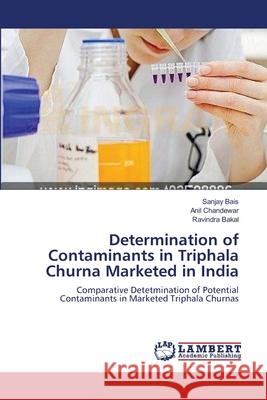Determination of Contaminants in Triphala Churna Marketed in India » książka
Determination of Contaminants in Triphala Churna Marketed in India
ISBN-13: 9783659106606 / Angielski / Miękka / 2012 / 76 str.
In order to ascertain accumulation of heavy metals, investigations were performed by using atomic absorption spectrometry. The results showed heavy metals accumulation in plant, procured from polluted sites as compared to unpolluted sites. The total of ten herbal products of various brands were selected randomly and tested for pesticide content. Of which 2 samples (H3 & H4) showing the presence of Endosulfan but within the limit given by W.H.O. The formulations are used daily by the patients suffering from constipation. The method reported was used for analysis of pesticide content in the present work for determination of Endosulfan content in Triphala Churna formulations in which chromatographic conditions were mobile Phase 0.1% acetic acid in Acetonitrile Flow rate 1ml/min, using Column C18, indicating the Endosulfan content in formulation no H3.(0.025ppm), and H4, (0.04 ppm), but the pesticide contamination indicated in such herbal formulation was in permissible limit as per WHO specification(0.05 ppm).Microbial contents in herbal products were examined as suggested in as per W.H.O. 3 samples did not conform to the W.H.O guidelines. The formulations are used daily by the patien
In order to ascertain accumulation of heavy metals, investigations were performed by using atomic absorption spectrometry. The results showed heavy metals accumulation in plant, procured from polluted sites as compared to unpolluted sites. The total of ten herbal products of various brands were selected randomly and tested for pesticide content. Of which 2 samples (H3 & H4) showing the presence of Endosulfan but within the limit given by W.H.O. The formulations are used daily by the patients suffering from constipation. The method reported was used for analysis of pesticide content in the present work for determination of Endosulfan content in Triphala Churna formulations in which chromatographic conditions were mobile Phase 0.1% acetic acid in Acetonitrile Flow rate 1ml/min, using Column C18,indicating the Endosulfan content in formulation no H3.(0.025ppm), and H4,(0.04 ppm), but the pesticide contamination indicated in such herbal formulation was in permissible limit as per WHO specification(0.05 ppm).Microbial contents in herbal products were examined as suggested in as per W.H.O. 3 samples did not conform to the W.H.O guidelines. The formulations are used daily by the patients











